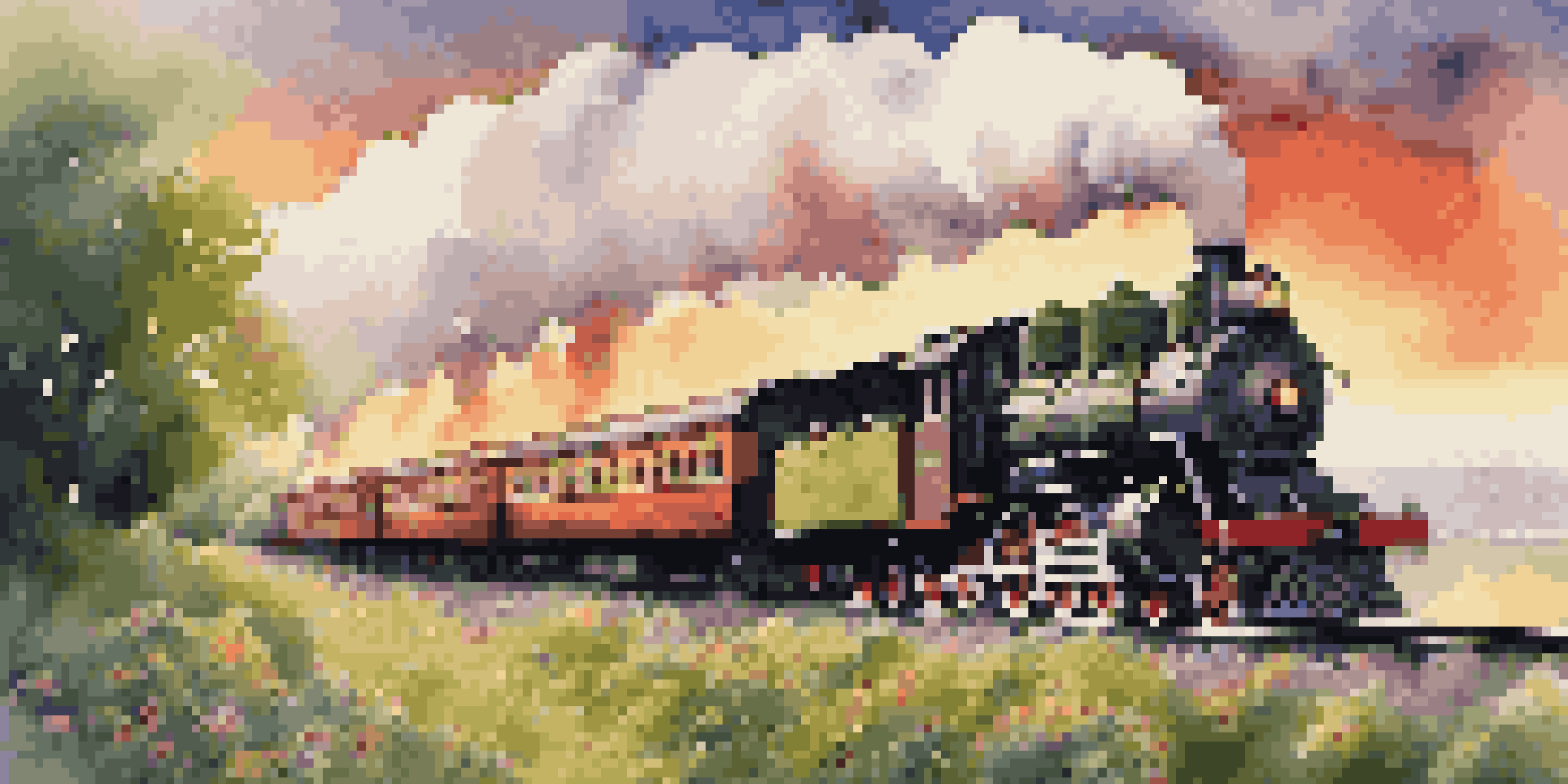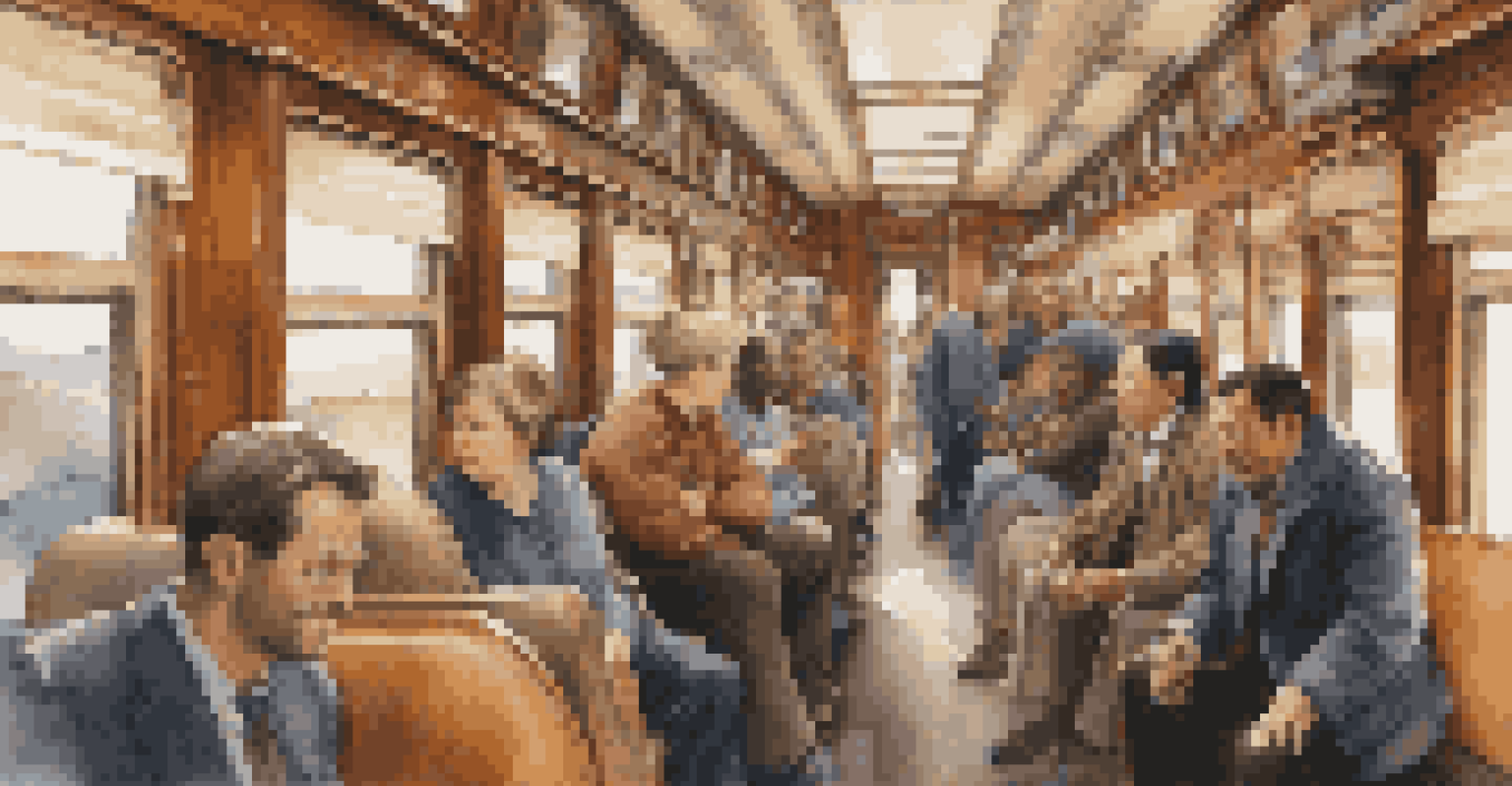The Cultural Impact of Train Travel in Literature

The Symbolism of Trains in Literature
Trains in literature often represent a journey, both physically and metaphorically. They can symbolize progress, change, and the passage of time. For instance, in 'Murder on the Orient Express' by Agatha Christie, the train serves as a microcosm of society, illustrating various human interactions and conflicts.
Life is a journey, not a destination.
This symbolism extends beyond mere travel; trains can also evoke nostalgia or a sense of adventure. Authors use trains to connect characters with their past or to propel them into new experiences. In 'The Girl on the Train' by Paula Hawkins, the train becomes a pivotal element in unraveling the story's mystery, linking the protagonist to her memories and emotions.
Ultimately, the train acts as a powerful narrative device that can shape the themes and character arcs within literature. By incorporating trains into their stories, authors invite readers to explore deeper meanings and connections.
Historical Context of Train Travel in Literature
Train travel gained prominence in the 19th century, coinciding with the industrial revolution. Literature from this era often reflects the excitement and anxiety surrounding this new mode of transportation. For example, Charles Dickens' 'The Signal-Man' illustrates the fears associated with technological advancements and their impact on society.

As trains became a staple of modern life, writers began to explore their effects on human relationships and societal changes. In 'Around the World in Eighty Days,' Jules Verne uses the train as a vehicle for adventure, showcasing how travel can broaden horizons and alter perspectives.
Trains as Symbols of Change
In literature, trains symbolize journeys that reflect personal growth, societal shifts, and the passage of time.
The evolution of train travel has continued to influence literature, with contemporary authors capturing the emotional and cultural significance of journeys. This historical context enriches readers' understanding of the themes that emerge from train travel in various narratives.
Trains as a Metaphor for Life's Journey
Trains often serve as a metaphor for life's journey, illustrating the ups and downs we encounter along the way. Just as trains have their routes, stops, and delays, so too do our lives. In 'The Alchemist' by Paulo Coelho, the journey towards one's personal legend mirrors the unpredictability of train travel.
The journey of a thousand miles begins with one step.
This metaphor extends to the characters we meet along the way, akin to fellow passengers on a train. Each encounter can dramatically alter our path, just as passengers influence one another’s experiences. In 'The Great Gatsby,' the train symbolizes the social mobility and dreams that define the American experience.
Ultimately, trains become a powerful representation of the human experience, reminding us that every journey is filled with lessons, challenges, and unexpected turns.
Cultural Reflections through Train Travel
Train travel in literature often mirrors cultural shifts and societal norms. As trains connect different regions, they also bring diverse cultures into contact, which can lead to rich narratives. For example, in 'The Railway Children' by E. Nesbit, the train is a bridge between different social classes and experiences.
Additionally, trains can highlight the contrasts between urban and rural life. Writers often depict the hustle and bustle of city life against the serene landscapes viewed from a train window. This juxtaposition can emphasize themes of isolation, community, or the search for belonging.
Cultural Reflections through Trains
Train travel often mirrors cultural dynamics, connecting diverse experiences and highlighting contrasts between urban and rural life.
Through these cultural reflections, authors craft stories that resonate with readers on multiple levels, enriching the narrative with layers of meaning and context.
Train Travel as a Catalyst for Change
In many literary works, train travel acts as a catalyst for change, propelling characters into new circumstances. For instance, in 'The Grapes of Wrath' by John Steinbeck, the journey by train symbolizes the Great Migration and the pursuit of hope amidst adversity. Here, the train is not just a mode of transport but a symbol of the quest for a better life.
The transformative power of train travel is also evident in stories where characters confront their pasts. In 'The Last Train to London' by Meg Waite Clayton, the train journey becomes a means of escape and survival during wartime, showcasing how trains can facilitate crucial turning points.
As characters embark on these journeys, they often undergo personal transformations, reflecting the broader societal changes occurring within the narrative. This dynamic interplay between train travel and change adds depth to the storytelling.
The Role of Trains in Adventure Narratives
Adventure narratives frequently utilize trains as a means to propel characters into thrilling escapades. The allure of the unknown and the excitement of travel create fertile ground for conflict and discovery. In 'The Adventures of Tintin: The Secret of the Unicorn,' Tintin's train journey is filled with suspense and intrigue, leading to unexpected revelations.
Trains also serve as a setting for dramatic confrontations or pivotal moments in adventure stories. The confined space of a train car can heighten tension, forcing characters to confront one another in ways that might not occur elsewhere. This is evident in 'Snowpiercer,' where the train becomes a microcosm of society, reflecting class struggles and survival instincts.
Emotional Impact of Train Journeys
Train journeys evoke deep emotions, serving as backdrops for introspection, nostalgia, and personal transformation.
By incorporating train travel into adventure narratives, authors create a sense of urgency and excitement, inviting readers to join the journey and experience the thrill of the unknown.
The Emotional Resonance of Train Journeys
Train journeys evoke a range of emotions, serving as a backdrop for personal reflection and growth. The rhythmic movement of the train often mirrors the ebb and flow of thoughts and feelings, providing a unique setting for characters to confront their inner struggles. In 'Trainspotting' by Irvine Welsh, the train symbolizes escape and the complexities of addiction and friendship.
Moreover, the experience of traveling by train can evoke nostalgia, prompting characters to reflect on their pasts and relationships. In 'Atonement' by Ian McEwan, the train journey becomes a metaphor for lost opportunities and the passage of time, deepening the emotional impact of the narrative.

Through these emotional journeys, literature captures the essence of human experience, reminding us that every trip on a train is more than just a physical journey—it’s a chance for introspection and connection.